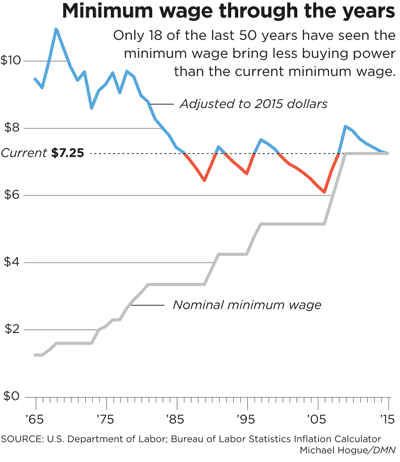If he could make $10 and change an hour instead of $7.50, Markeese Griggs would buy himself a decent pair of gloves.
A city of Dallas sanitation worker, Griggs spends 10 hours a day on the back of a garbage truck. The contractor he works for provides new cotton gloves every week or two, but they wear out quickly — sometimes within a day.
Cotton doesn’t hold up to long days of gripping, lifting and emptying trash cans. When cotton gets wet, it stays wet, and Griggs’ hands turn pruney.
Sometimes, guys fall off the truck. Sometimes they’re knocked off or scratched by branches in overgrown alleys. A friendly homeowner may wave or toss them a bottle of water. Most do neither.
It’s tough work for $7.50 an hour.

The Dallas City Council has talked for months about raising the wages of the contract workers who do some of the city’s dirtiest work, from picking up the garbage to landscaping to mopping floors and cleaning toilets at City Hall.
Several council members indicated support for a requirement that the workers be paid a “living wage,” calculated at $10.37 for a single adult in Dallas County. (The federal minimum wage is $7.25.)
But Mayor Mike Rawlings and City Manager A.C. Gonzalez decided this month to drop that idea, after the city staff estimated that a living wage for contract workers could cost Dallas taxpayers $3 million immediately, and more than $12 million a year as the requirement eventually got phased in through future contracts.
The higher wage would benefit more than 1,700 contract workers. (All employees who work directly for the city already make at least $10.62 an hour.)
The contract for sanitation workers, about 200 of them, is the largest of 80 city employment contracts. Together, the contracts cost the city more than $100 million annually.
Griggs and his fellow garbage workers had talked about the possibility of a living wage. They talked about what they’d do with the extra money. Going from $7.50 to $10.37 an hour would raise Griggs’ annual base pay to $21,642 from $15,652.
He said he’d put the money toward school supplies for his four kids.
And better gloves.
| Sanitation worker Markeese Griggs works to empty trash cans in East Dallas. (Louis DeLuca/Staff Photographer) |
| ________________ |
Griggs, 32, is soft-spoken, so much so that he can barely be heard aboard the DART train that he takes to work each day from his apartment in southeast Oak Cliff. Including walking time and a bus trip to train station, the commute takes an hour and a half.
When his family goes to the grocery store, he makes excuses not to go along. He doesn’t like to hear his kids — two sons, 6 and 10, and two daughters, 5 and 15 — ask for things he can’t afford. If he has a little money left over at the end of the week, he’ll sometimes buy them ice cream, a vain attempt to make up for all the times he has to say no.
His wife of 15 years is out of work.
Asked how he gets through each month, he replies: “A whole of lot of prayer,” then adds, “Family helps sometimes.”
With nine months on the job, he was the veteran on a morning not long ago when he and another sanitation worker rode a truck up and down Lakewood’s alleys. Over and over, the two men dragged trash cans to the truck, planted their legs, lifted the cans and dumped their contents into the truck. Then they stood back as the garbage was compacted.
Dust billowed. Griggs covered his face and coughed. Some days, he wears a bandana over his mouth.
His work schedule is 10 hours a day on Mondays, Tuesdays, Thursdays and Fridays. Sometimes there’s an opportunity to work Wednesdays for extra pay.
Griggs brings home $1,300 to $1,400 a month, more than half of which goes to pay the rent on his three-bedroom apartment. The rest gets sucked up quickly by utilities, food and clothing.
| Sanitation worker Markeese Griggs rides on a garbage truck in East Dallas. (Louis DeLuca/Staff Photographer) |
| ________________ |
On workdays, Griggs is awake by 3:30 or 4 a.m. He walks to a bus station, then catches a bus to the Buckner Station, the southernmost stop on DART’s Green Line. By 7 a.m. he’s grabbing cans.
On days off, he takes his kids to the park. He plays a lot of chess, which he calls “exercise for the brain.”
He’d like to find an affordable house in southern Dallas, somewhere closer to work and somewhere where the kids would have a yard to play in.
He doesn’t like them running loose on the streets. He knows first-hand what that can lead to.
After dropping out of high school, Griggs served time for a string of drug-related felonies. His criminal record has cost him some jobs and locked him into others, mostly dead-end, minimum-wage work.
Now he’s trying to serve as an example to his kids: “You don’t want to be struggling like me, you need to stay in school.”
Not everybody can hack it on the back of the truck. Many guys struggle with the summer heat. Jumping between truck and asphalt, you dehydrate quickly, Griggs said. You get cramps. You might not have a break until midday.
Ester Henderson, a supervisor who oversees eight trucks, said: “Guys that get hired in the summertime, they’re not used to the heat and dehydration. They might only work a few weeks.”
She makes sure her crews have water.
And when she can, she brings them extra gloves.
http://www.dallasnews.com/news/local-news/20150929-for-one-dallas-sanitation-worker-a-living-wage-would-mean-…-decent-gloves.ece
